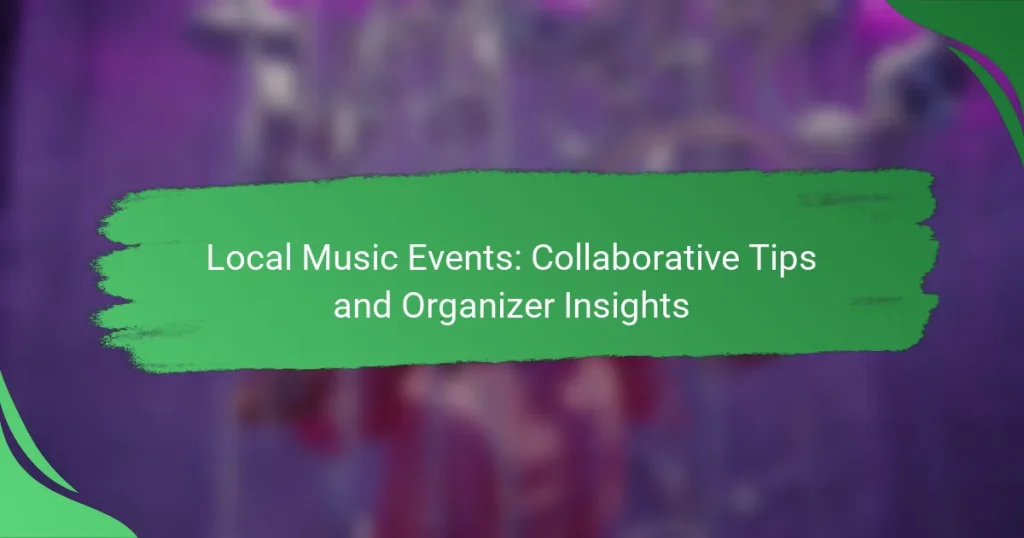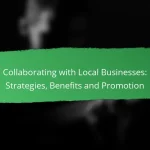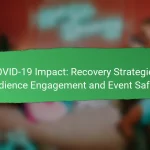Organizing local music events requires a blend of strategic planning and community engagement, particularly in vibrant scenes like New York City. By collaborating with local artists and utilizing effective promotional platforms, organizers can create memorable experiences that resonate with audiences and strengthen the local music community.
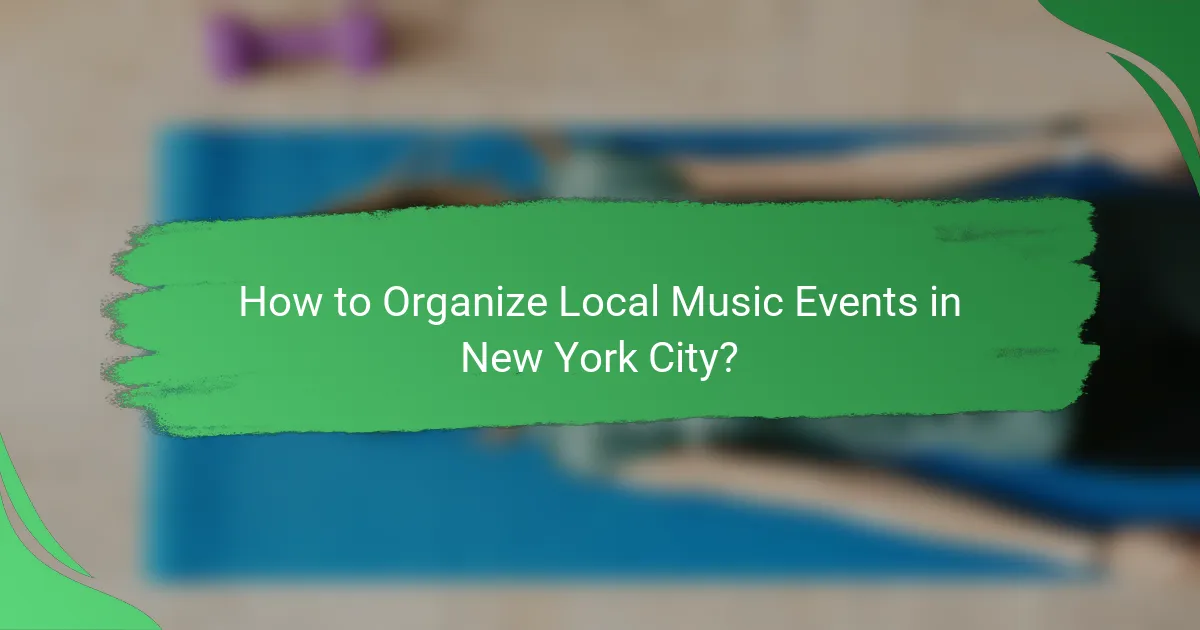
How to Organize Local Music Events in New York City?
Organizing local music events in New York City involves careful planning, collaboration with venues, and effective ticketing strategies. Success hinges on understanding the local music scene and leveraging community connections.
Utilize Eventbrite for ticketing
Eventbrite is a powerful tool for managing ticket sales and registrations for music events. It allows organizers to set up events quickly, track sales, and manage guest lists efficiently.
Consider using features like promotional codes and tiered pricing to attract different audiences. For instance, early bird tickets can incentivize early purchases, while VIP packages can enhance revenue.
Collaborate with local venues
Partnering with local venues is crucial for successful music events in NYC. Establish relationships with popular spots that align with your event’s genre and target audience.
Negotiate terms that benefit both parties, such as shared marketing efforts or revenue splits. Venues often have established audiences, which can help boost attendance and create a vibrant atmosphere.
Engage with community influencers
Community influencers, such as local musicians, bloggers, and social media personalities, can amplify your event’s visibility. Engaging these individuals can help spread the word and attract a larger audience.
Consider offering influencers free tickets or exclusive access in exchange for promotion. Their endorsement can lend credibility and encourage their followers to attend your event.
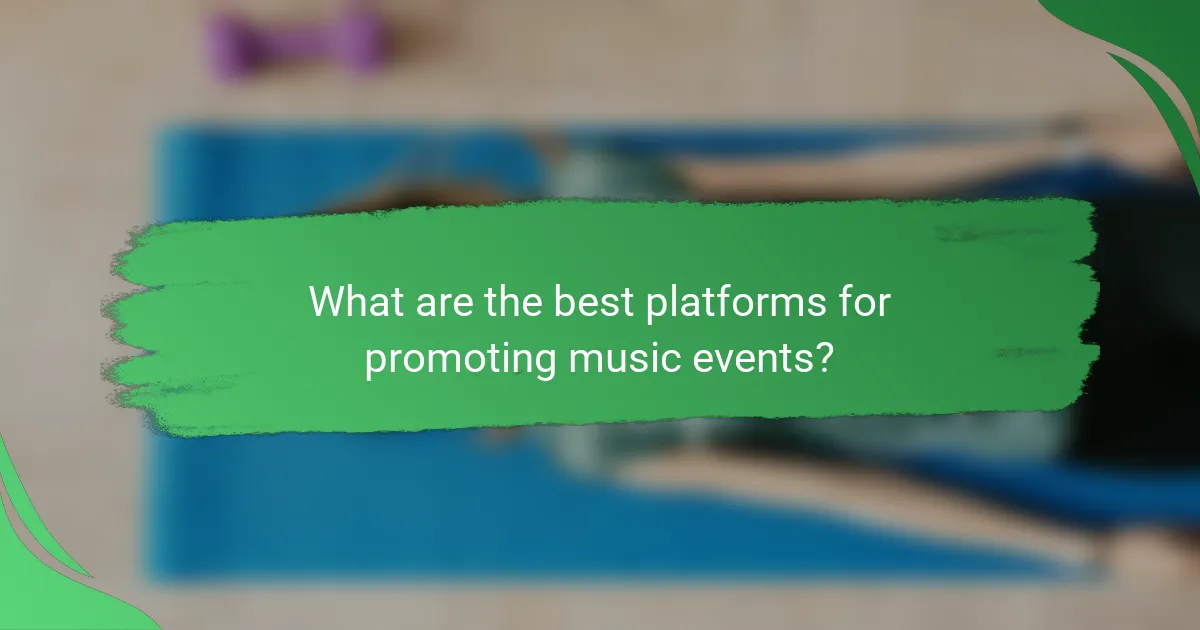
What are the best platforms for promoting music events?
Effective promotion of music events relies on utilizing the right platforms to reach your target audience. Key platforms like Facebook, Instagram, and Meetup each offer unique advantages for maximizing local engagement and community involvement.
Facebook Events for local reach
Facebook Events is a powerful tool for promoting music events, especially for local audiences. You can create an event page that includes essential details such as date, time, location, and ticketing information, making it easy for attendees to RSVP and share.
To enhance visibility, encourage attendees to invite friends and share the event on their timelines. Consider using Facebook Ads to target specific demographics in your area, which can significantly increase your event’s reach.
Instagram for visual engagement
Instagram is ideal for visually showcasing your music events through engaging images and videos. Use high-quality visuals of past events, artist performances, and behind-the-scenes content to attract attention and generate excitement.
Utilize Instagram Stories and Reels to create dynamic content that can capture the interest of potential attendees. Incorporate relevant hashtags and location tags to improve discoverability among local users.
Meetup for community building
Meetup is designed for building communities around shared interests, making it a great platform for music events. By creating a Meetup group focused on your genre or local music scene, you can foster a dedicated audience that regularly engages with your events.
Encourage group members to participate in discussions and share their experiences, which can help create a sense of belonging. Consider offering exclusive perks for Meetup members, such as early access to tickets or special discounts, to strengthen community ties.
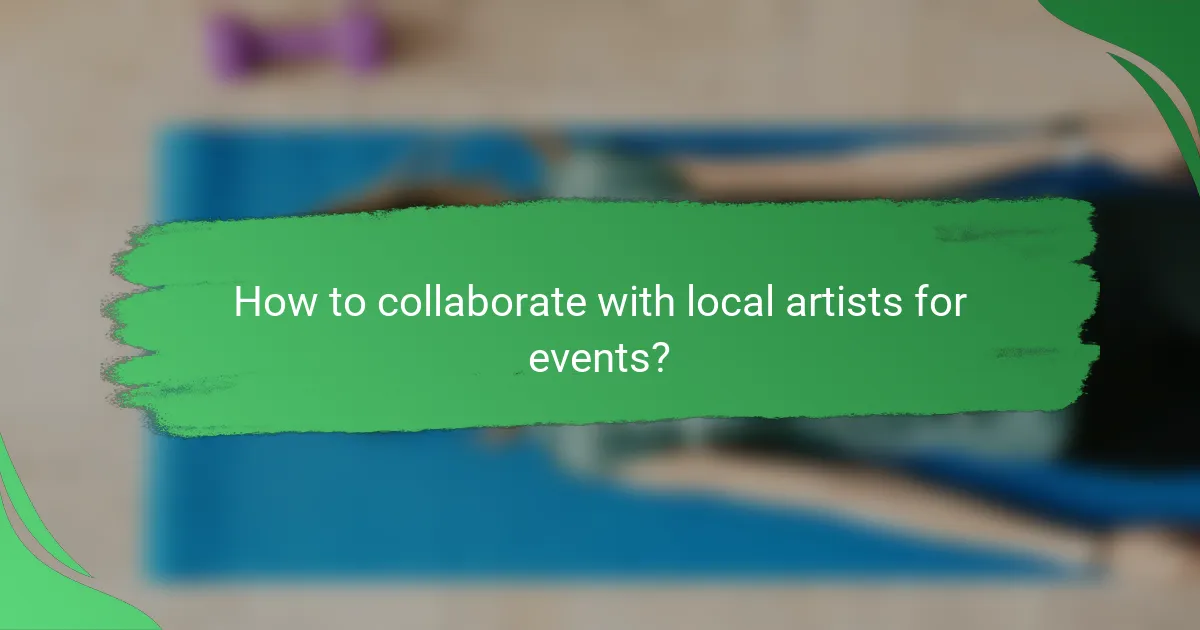
How to collaborate with local artists for events?
Collaborating with local artists for events involves creating mutually beneficial opportunities that enhance the artistic community and attract audiences. Effective collaboration can include hosting events that showcase local talent, sharing resources, and providing promotional assistance.
Host open mic nights
Open mic nights are a great way to engage local artists and give them a platform to showcase their talents. These events allow musicians, poets, and performers to present their work in a supportive environment, often leading to new collaborations and networking opportunities.
Consider scheduling open mic nights regularly, such as once a month, to build a community around these events. Ensure you have a clear sign-up process and promote the event through local social media channels to attract participants and audiences alike.
Offer revenue-sharing models
Implementing revenue-sharing models can incentivize local artists to participate in your events. This approach allows artists to earn a percentage of ticket sales or merchandise profits, making it financially viable for them to collaborate.
For example, you could set up a model where artists receive 70% of ticket sales for their performances. This not only encourages participation but also fosters a sense of ownership and investment in the event’s success.
Provide promotional support
Promotional support is crucial for attracting both artists and audiences to your events. Collaborate with local artists by helping them promote their performances through your marketing channels, including social media, email newsletters, and local press releases.
Consider creating co-branded promotional materials that highlight both the event and the artists involved. This not only increases visibility but also strengthens community ties, as artists feel supported by local organizers.
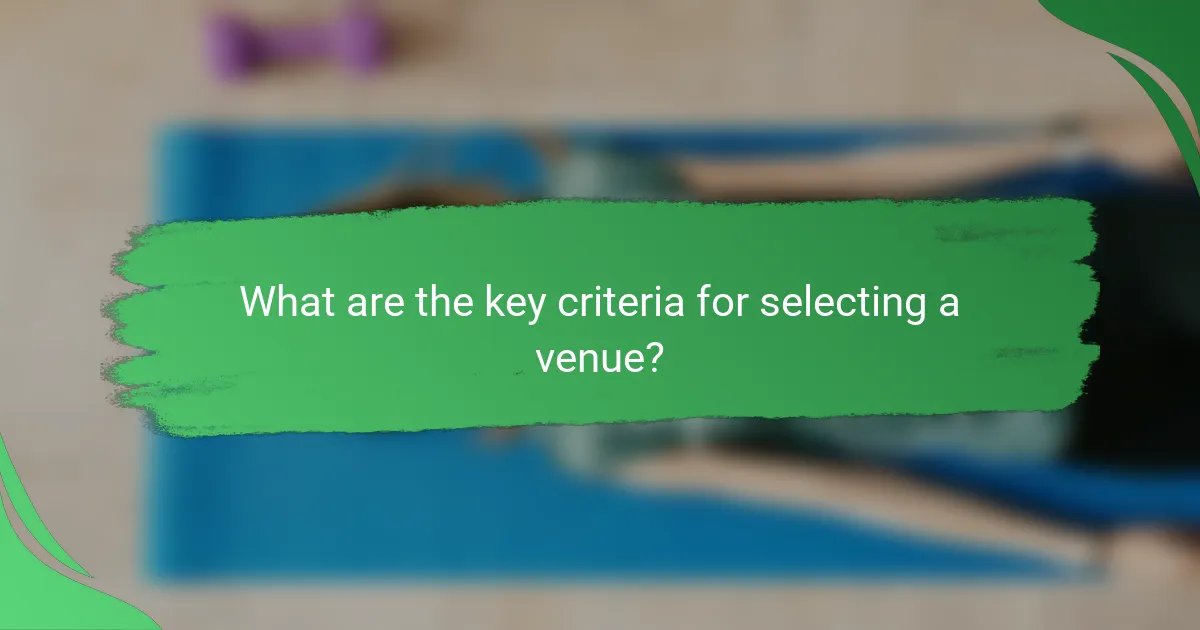
What are the key criteria for selecting a venue?
When selecting a venue for local music events, key criteria include capacity, layout, accessibility, location, and parking availability. These factors significantly influence the event’s success and overall attendee experience.
Capacity and layout considerations
Capacity refers to the maximum number of attendees a venue can accommodate comfortably. For music events, consider venues that can hold anywhere from a few dozen to several hundred people, depending on the expected turnout.
The layout is equally important; it should facilitate good sightlines and sound distribution. Venues with a stage that is elevated or centrally located often enhance the audience’s experience, while flexible seating arrangements can adapt to different event formats.
Accessibility features
Accessibility features ensure that all attendees, including those with disabilities, can enjoy the event. Look for venues that comply with local regulations, such as the ADA in the United States, which requires accessible entrances, restrooms, and seating options.
Additionally, consider the availability of assistive listening devices and clear signage. These features not only improve the experience for individuals with disabilities but also demonstrate inclusivity, attracting a wider audience.
Location and parking availability
The venue’s location plays a crucial role in attendance. Choose a site that is easily reachable by public transport and is in a safe neighborhood. A central location can significantly boost turnout.
Parking availability is another critical factor. Ensure there are sufficient parking spaces nearby, or consider venues that offer partnerships with local parking facilities. Providing clear information about parking options can help attendees plan their visit effectively.
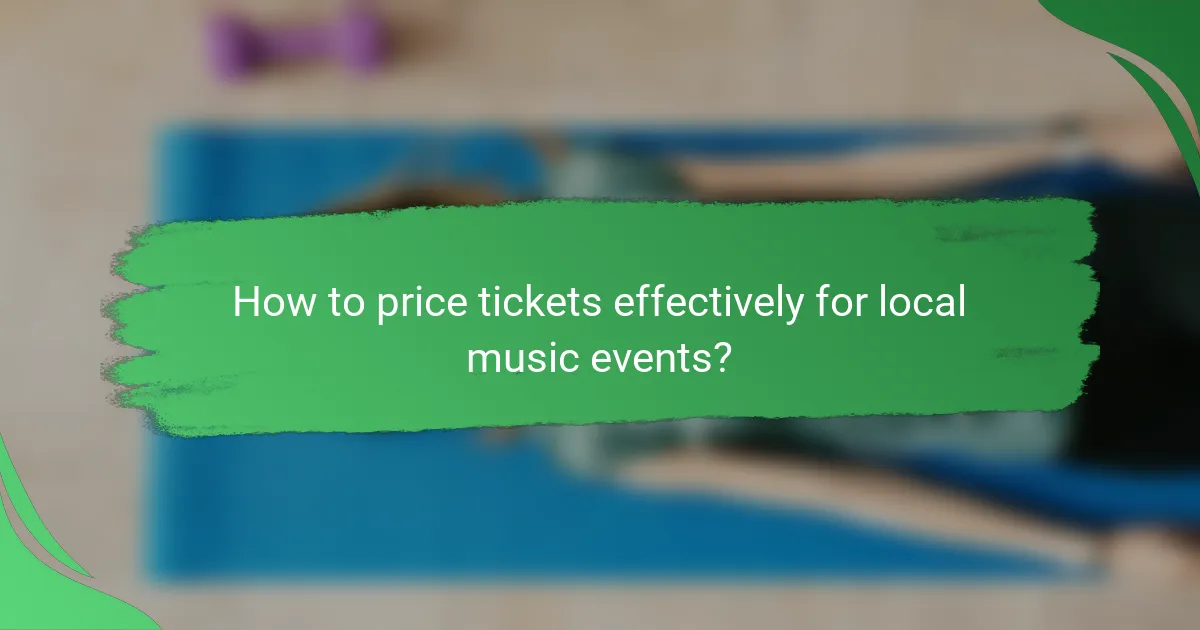
How to price tickets effectively for local music events?
To price tickets effectively for local music events, consider the market demand, the costs involved, and the target audience’s willingness to pay. A balanced approach ensures that you cover expenses while attracting attendees.
Research competitor pricing
Start by analyzing ticket prices for similar local music events in your area. Look at the pricing strategies of competitors, including their ticket tiers and any additional fees they may charge. This will help you position your event competitively.
Consider factors such as the venue size, artist popularity, and event type when comparing prices. For instance, if local concerts typically range from $10 to $30, aim to set your prices within this range while reflecting the unique value of your event.
Consider artist fees and expenses
Artist fees can vary significantly based on their popularity and experience. Ensure you account for these costs when setting ticket prices. Additionally, factor in other expenses such as venue rental, equipment, marketing, and staffing.
A simple breakdown of costs can help you determine a minimum ticket price. For example, if your total expenses are $1,000 and you expect 100 attendees, you should price tickets at least at $10 to break even, not including profit.
Offer early bird discounts
Early bird discounts can incentivize attendees to purchase tickets in advance, providing you with upfront cash flow. Consider offering a discount of 10-20% for tickets purchased a few weeks before the event.
This strategy not only boosts initial sales but also helps gauge interest in your event. Ensure to communicate the limited availability of these discounts to create urgency among potential attendees.
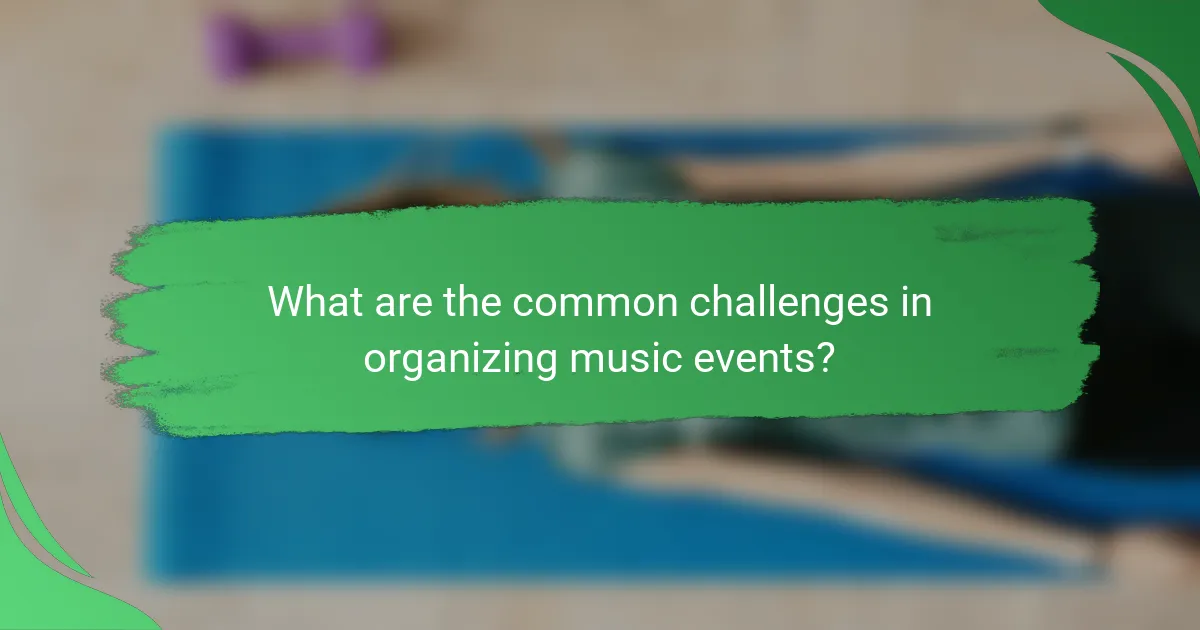
What are the common challenges in organizing music events?
Organizing music events often involves navigating various challenges that can impact the overall success. Key issues include managing artist schedules, securing necessary permits and licenses, and handling last-minute changes effectively.
Managing artist schedules
Coordinating artist schedules is crucial for a successful music event. This involves aligning the availability of performers, which can be complicated due to their existing commitments and travel plans. It’s advisable to establish a clear timeline and communicate regularly with artists to avoid conflicts.
Consider using scheduling tools or apps that allow for easy updates and visibility for all parties involved. Providing a range of potential dates can also help in accommodating artists’ busy calendars.
Securing permits and licenses
Obtaining the necessary permits and licenses is a vital step in organizing music events. This may include performance licenses, noise permits, and venue-specific approvals, which can vary significantly by location. Research local regulations well in advance to ensure compliance and avoid fines.
Engaging with local authorities early in the planning process can streamline this aspect. Keep a checklist of required documents and deadlines to stay organized and ensure all permits are secured before the event date.
Handling last-minute changes
Last-minute changes are almost inevitable in event planning, and having a strategy to manage them is essential. This could involve sudden artist cancellations, weather issues, or venue changes. Establishing a contingency plan can help mitigate the impact of these changes.
Maintain open lines of communication with all stakeholders, including artists, vendors, and attendees. Consider having backup performers or alternative venues in mind, and ensure that your team is prepared to adapt quickly to any situation that arises.
